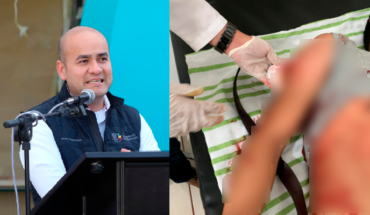
The forum that collects this commentary is one of many that are on the deep internet and who are under observation of the Central Cybercrime Unit (UCC) of the Spanish police.
“Paedophile circles. That’s what we call them,” explains Inspector Cecilia Carrión, a member of the UCC’s Group III for the Protection of the Child. “There they share opinions, express the property freely about their desires, their fantasies, they exchange advice.”
In those same forums someone asks if there will be “people taking them out Packs” to children and whether they will upload new materials on a certain online platform.
The packs they refer are usually photos or videos of children, in many cases naked or while being abused by an adult.
“In this case,” Carrión explains, “refers to contacting minors and convincing them through the deception that they themselves are recorded in erotic or sexual acts.”
While this mode of interacting is common among paedophiles and paedophiles, what the Spanish authorities have seen is the marked increase in their activities due to confinement by the coronavirus pandemic.
All cybercrimes are on the rise due to increased online activity.” One of the most recurring themes since the confinement began in Spain is how they can profit from this situation,” adds Carrión.
In some of these comments, someone explicitly describes how you would like to spend quarantine with one child at home, while another wonders if confinement is a good opportunity to have new content on the download platforms.
According to data that BBC Mundo has had access to, the week of 17 March (three days after the Spanish government declared alarm status) at 24, some 17,000 downloads of child pornography material were recorded.
The following week, from March 24 to 31, downloads rose to more than 21,000, up nearly 25%.
“Now it has decreased a little and stabilized, but there are still more downloads than normal,” Carrión adds.
But it’s not a problem that only binds Spain.
Indeed, in a report by the European Police Office (Europol) published in early April, its executive director, Catherine de Bolle, declared he to be “concerned about the increase in online child sexual abuse” in the countries most affected by the pandemic.
“We are all at home and constantly connected. We all try to do online what we can’t do in person,” says Nunzia Ciardi, head of the Italian Postal and Telecommunications Police. “And clearly all cybercrime is on the rise.”
Italy was, for several weeks between March and April, the country where there were the most cases of infected and covid-19 deaths worldwide.
Nunzia Ciardi, Head of the Italian Post office and telecommunications police, says the number of covert operations to detect paedophiles online has increased. It was also the first Western country to declare, on 9 March, the state of confinement throughout the national territory – a measure that remains in force.
“Our indicators suggest that in this period there is an increase in child pornography offences and those of sexual blackmail to minors,” adds Ciardi.
According to data accessed by BBC Mundo, 83 crimes for crimes related to child pornography were reported online between 1 March and 15 April 2019 in Italy. In the same period this year – which coincides with that of quarantine – the complaints were 181, more than double.
In addition, so far this year, the Italian police have seized 108,123 GB of this type of digital content, which is equivalent to downloading on mobile 50 times the entire Netflix series “The Paper House”.
Finally, Italian police recorded a decrease in the average age of victims: so far this year, the hardest hit are those between the ages of 10 and 13.
Many of the alerts that reach police from around the world come from the U.S.-based National Center for Missing and Exploited Children (NCMEC).
NCMEC has a service called CyberTipline through which electronic service providers (ESPs) and US-based technology companies (Microsoft, Facebook, Twitter, Google, TikTok, among others) have to report by law if they detect anywhere in the world where they operate content with child abuse.
The NCMEC then reviews these reports and shares them with law enforcement authorities in the countries where the abuse has been located.
In March this year, NCMEC received more than two million notifications of this material, more than double those reported in the same month of 2019.
“It’s a dramatic increase!” says TO BBC Mundo John Shehan, vice-president of NCMEC.
The U.S. NCMEC recorded a 106% increase in online child abuse notices in March 2020 from March last year.” Paedophiles adapt easily to the context, explains Marie-laure Lemineur, deputy executive director of ECPAT International, an NGO that has been working for 30 years on campaigns to combat the sexual exploitation of children.
“Never in history have so many children connected, and this increases the chances of them taking risks.”
However, Lemineur clarifies, “their ways of acting, their ways of operating, the advice that is given between them are the same as always.”
According to Inspector Carrión, the vast majority of paedophiles acting online share three traits.
The first is that “in 99% of cases they are men”.
“There are them from teenagers, even between the ages of 13 and 15, to retirees. And of all social classes, from the unemployed and immigrants to senior managers and reputable doctors.”
Authorities detected in the dark nets some manuals written by paedophiles with tips for not being discovered. The second trait is that those who come to these types of forums “are paedophiles who have a certain technological background. This allows them to take protective measures to navigate as anonymously as possible that they then share with each other. We even found manuals with tips on how to avoid the work of the police, for example.”
Some of these recommendations range, for example, from the type of browser they use to browse the web to which keywords to use to find pornographic content, going through which platform to download them.
In the latter case the most commonly used are the networks peer-to-peer (P2P), such as eMule, BitTorrent, Gnutella and Ares Galaxy, the latter very popular in Spanish-speaking countries.
On these platforms the content is not downloaded from a server but from another computer on which it is stored.
“Because this material is still stored on the computers of other paedophiles, it will always be in constant circulation and it is very difficult to eliminate, because there is no server to turn to,” explains Carrión.
“Once these videos go viral among paedophiles, it’s impossible to remove them from those networks,” adds David Reguero, a member of the Spanish Police’s Child Protection group.”
All the authorities consulted for this investigation also warn of two other problems that may occur in the coming months, once the confinement is over.
Paedophiles pose as children or teenagers on social media to convince minors to send them nude videos or photos.” These are problems that usually occur after the Christmas, Easter or summer holidays, that is, when children spend more time at home, in front of the computer or with mobile, connected to the internet,” says Reguero, who in the last 12 years has been responsible for tracking this type of content.
“On these occasions we always notice an increase in new abuse videos and the increase in cases of Grooming“, that is, the trick with which the child is deceived to access sexual content activities.
Abusers typically use a fake profile on social media most frequented by minors or pose as one of them in the most popular online video game chats, such as Fortnite.
Once they get their attention and confidence, they start asking for images or videos, nudes or in sexual attitudes. Several sources indicate that many videos of children recording naked come from the online chat site Omegle. They then use those same images to blackmail them or threaten them to get more.
But the cases of Grooming unknowns are not the only threats that children confined at home face.
In many cases child abuse takes place on the victims’ intimate circuit.” However, these cases are not easy to uncover,” Reguero continues.
“The abuser manages to keep the child coerced for weeks or even months. The complaints come to us only when the child can no longer and tells his parents or because the parents manage to find out.”
“In most images of child sexual abuse, adults belong to the victim’s inner circle,” says Marie-laure Lemineur, whose organization, ECPAT international, operates in 102 countries.
“He who produces the images may be the brother, father, grandfather, or family friend. These children live with abusers, who, during quarantine, have a better chance of producing these images.”
According to Lemineur, this is a problem that affects all countries, both on the demand side cthe one on offer. In fact, law enforcement authorities and organizations in other countries such as the United States, Denmark, Sweden and Brazil have warned of the same problem.
“Some police, especially those in Western countries, are more aware of this phenomenon,” Lemineur concludes. “But the fact that in other countries is not so visible does not mean that it does not exist.”





